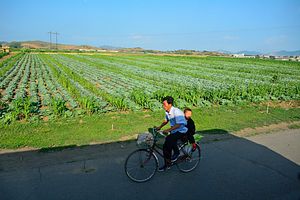North Korea appears to be clamping down on international aid groups in the country. On Wednesday, the country’s propaganda news service announced the deportation of Sandra Suh, a U.S. citizen, accusing her of carrying out acts of propaganda against the state. It was the second deportation of an aid worker in less than two months.
The Korean Central News Agency said Suh had “engaged in anti-DPRK propaganda abroad with photos and videos about the DPRK she secretly produced and directed, out of inveterate repugnancy toward the DPRK.”
Timothy Park, who accompanied Suh to North Korea, told Voice of America that the claims against her were without basis. Suh has been named in the media as the founder of Los Angeles-based Wheat Mission Ministries.
The KCNA’s announcement came just a week after a German aid agency told Reuters that one of its workers was expelled from the country in February.
Meanwhile, a Canadian pastor has been detained in North Korea since January, after entering the country on what his church has insisted was routine humanitarian work.
The regime’s latest wave of hostility toward foreign aid groups ironically coincides with a call from the United Nations for increased international aid to the country. The world body called for increasing aid to to $111 million, more than doubling last year’s funding. The UN points to widespread food scarcity, malnutrition, and sanitation problems.
The recent expulsions are likely to renew debate over the feasibility of providing foreign aid to North Korea.
“North Korea shouldn’t even need humanitarian aid,” Joshua Stanton, the author of the blog One Free Korea and a skeptic of aid work in the country, told The Diplomat. Stanton continued:
According to the economist Marcus Noland, North Korea could close its food gap with ‘less than two-tenths of one percent of national income or one percent of [its] military budget.’ Its known annual spending on luxury goods is six times the amount of the UN’s latest appeal for North Korea. North Korea’s elite live in obscene wealth while most people go hungry. Just as every North Korean who died in the Great Famine of the 1990s was a victim of Kim Jong-il’s priorities, hungry North Koreans today are victims of Kim Jong-un’s priorities — not weather, not lack of resources, and not sanctions.
Aid organizations contacted by The Diplomat were reticent about the latest deportations.
Song Jeong-do, a spokesman for Korean Sharing Movement, a Seoul-based NGO that does aid work in North Korea, said it was hard to comment on how the apparent clampdown might affect its work, especially without knowing the reasons behind the expulsions.
“Because Korean Sharing Movement is a South Korean group, we aren’t directly connected to Korean American or international groups, or their work and the deportations,” he said.
Kim Hartzner, managing director of Denmark-based Mission East, another foreign aid group with operations in the country, declined to comment on “any political issue or anything in North Korea.”
































